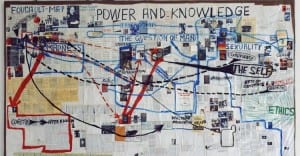2015–16 Independent Social Research Foundation
Mid-Career Fellowship
Following is a brief summary of the research I will be undertaking this year. To read the full version of the proposal, visit the ISRF website. Check back here for developments, links to the project website (forthcoming) and ways to get involved!
The thesis to be interrogated in this project is that theoretical and practical resources for democratising contemporary social institutions – for a ‘politics of possibility’ – exist in everyday thinking and practice, but that we need interdisciplinary methods of philosophical, sociological and critical-practical research in order to disclose them. This project develops an interdisciplinary methodology of practical philosophy that is designed to deepen understandings of how particular forms of power and powerlessness in neoliberal institutions foreclose possibility, and to identify practices through which they can be challenged and transformed. While we now have a good understanding of how neoliberal rationality is learned in institutions, this has not been matched by philosophically credible studies of the limits and possibilities of how it may also contribute to the formation of alternative forms of reason. Most conceptual studies of neoliberal rationality are therefore separated from the strategies and struggles of professionals and activists to generate new possibilities for action in everyday life.
This project will bridge these bodies of work by examining how different articulations of neoliberal rationality create and inhibit specific forms of possibility. It grew out of a concern that social science, critical philosophy and action research are often more successful at diagnosing the ‘crisis of hope’ in contemporary society than enabling active responses to it, particularly amongst people who work in key socialising institutions. It develops work by critical theorists who attribute the contraction of human and environmental possibility to the expansion of neoliberal and technological rationalities throughout everyday life, and who argue this structurally forecloses spaces for political agency. This research also builds on a rich tradition of educational research which suggests that critical pedagogies can be possibility-enabling practices, but rarely explores what possibility actually is or focuses on how specific practices generate specific kinds of possibility within particular neoliberal contexts. The research will produce an integrated philosophical and empirical picture of how possibilities ‘contract’ in neoliberal society and evaluate the effects of this knowledge-in-use in its application in different institutional contexts. It brings philosophical concept development, empirical sociological research, and methods of participatory action research together into an integrated study which is designed not only to produce new knowledge in each dimension, but to understand the knowledges that we use to connect them in practice.
This project challenges the segregation between philosophies of possibility, theories of political rationality and everyday practice in neoliberal institutions order to address two ‘real-world’ problems. One is that educators working in neoliberal institutions who are not academics or activists have little access to philosophically and empirically robust knowledge about how possibilities for critical agency are foreclosed and enabled in this context. The second real-world problem is that while theories of power, powerlessness and empowerment in neoliberal systems are shaped largely by academic social scientists, many lack insight into (or experiences of struggling with) how this conceptual work is confirmed, mediated by, or challenged in practice. This project therefore does not so much challenge incumbent critical theories and political practices as seek to heal their broken relationships, and to strengthen the potential of their cross-fertilisation for enabling praxis. Its methodology unites the conceptual rigour of critical philosophy with the empirical texture of qualitative methods and the emergent, practice-oriented methods of action research to create practical-critical knowledge about the ‘contraction’ and ‘expansion’ of possibility in neoliberal institutions. My hope is that this act will contribute to the construction of what Ernst Bloch once called an ‘architecture of hope’ which can substantively challenge the hegemony of hopelessness in neoliberalised social institutions today.
